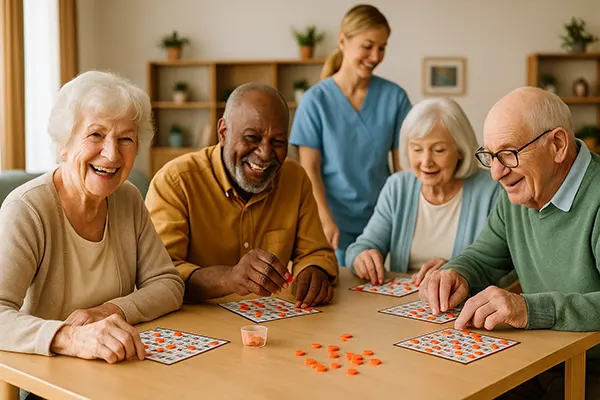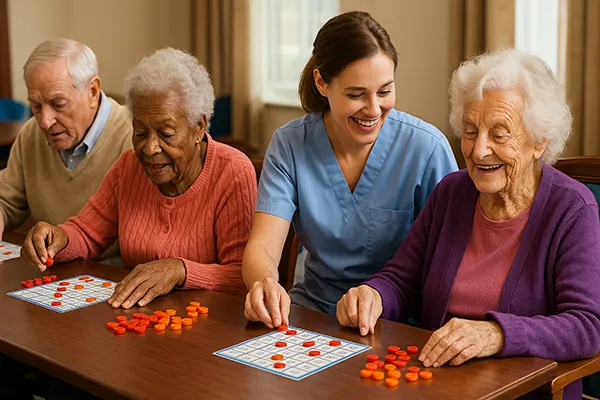Bingo as Social Therapy: Use in Geriatric Clinics across Europe and the USA

Bingo has long been associated with leisure and community, but in recent years it has evolved into a recognised form of social therapy within geriatric care settings. Medical professionals and psychologists are increasingly incorporating structured bingo sessions into holistic treatment plans to support mental health, cognitive function, and emotional wellbeing among elderly patients. With ageing populations in both Europe and the United States, the therapeutic potential of bingo is garnering attention in clinical and academic circles alike.
How Bingo Supports Mental and Cognitive Health
Clinical evidence shows that bingo provides cognitive stimulation that is essential for preserving mental faculties in older adults. The game’s structure—requiring concentration, number recognition, memory, and rapid responses—targets several cognitive domains simultaneously. This has made it especially valuable in treating patients with early-stage dementia or mild cognitive impairment. In studies from the UK’s National Health Service (NHS), bingo was found to improve reaction times and short-term memory retention among participants aged 70 and older.
In addition to its mental demands, bingo introduces predictability and routine, which can reduce anxiety and confusion in elderly patients. Geriatric clinics in Denmark, Germany, and the Netherlands often integrate bingo sessions into weekly schedules to provide consistency and reduce restlessness. Patients benefit not only from the gameplay but also from the calming ritual of repeated participation.
A study published in 2024 by the American Geriatrics Society revealed that residents in long-term care facilities who played bingo twice a week exhibited slower rates of cognitive decline compared to those who did not participate in any structured mental activities. These results have influenced care strategies in facilities throughout the United States.
Emotional Benefits and Reduction of Loneliness
Beyond cognitive stimulation, bingo fosters emotional connection among older adults, especially those living in care facilities or facing social isolation. It serves as a low-pressure social environment where participants interact, laugh, and share experiences, helping to combat feelings of loneliness and depression.
Geriatric psychiatrists from institutions like Karolinska University Hospital in Sweden have praised bingo as an accessible method to reduce emotional withdrawal. When coordinated with the help of facilitators or therapists, these sessions can become moments of genuine interpersonal exchange, especially valuable for patients with limited mobility or verbal impairments.
In the US, centres such as Cleveland Clinic have integrated “therapeutic bingo” with counselling sessions. These sessions include guided social interaction prompts, allowing therapists to observe patient responses and address social anxiety or behavioural signs in a non-threatening setting.
Integration into Formal Healthcare and Care Planning
Bingo has transitioned from being a leisure activity to a formally recognised component of geriatric care plans. Institutions across Europe and North America increasingly include it in occupational therapy programmes, supported by outcome-based assessments. Healthcare professionals are trained to adapt the rules and format of the game to accommodate patients with specific impairments.
In Germany and France, public-funded care homes have received grants under EU ageing programmes to enhance the quality of life for elderly citizens, where structured bingo therapy is part of the budgeted mental wellness activities. The use of large-print cards, voice amplifiers, and even digital bingo apps adapted for tablet use allows wide accessibility.
The professionalisation of therapeutic recreation has also contributed to the game’s formal status in healthcare. Certified recreational therapists in the US often use bingo as a tool in Individualised Care Plans (ICPs), documenting engagement levels and noting behavioural improvements over time. This data is useful for physicians and family members monitoring a patient’s psychosocial progress.
Staff Training and Implementation Challenges
While the benefits of bingo therapy are well documented, implementing such programmes requires proper staff training. Not all recreational aides or care workers are immediately equipped to facilitate sessions in a therapeutic context. Emotional sensitivity, communication skills, and understanding of age-related conditions are essential.
Facilities in Belgium and Spain have launched pilot programmes in collaboration with local universities to train volunteers and staff in delivering structured bingo sessions. Training includes modules on group dynamics, therapeutic communication, and recognition of early warning signs of distress or disengagement.
Another key challenge is sustaining interest among residents. To address this, clinics often theme sessions around holidays, historical events, or music—transforming a basic game into a culturally enriching experience. Thematic diversity helps keep engagement levels high, especially for long-term residents who might otherwise become indifferent to repetitive formats.

Digital Bingo and Telehealth Applications
The pandemic accelerated the digitisation of many healthcare services, and bingo was no exception. Geriatric clinics and nursing homes began experimenting with digital bingo platforms designed for elderly users, using tablets and projectors to conduct interactive sessions across rooms and even institutions.
In Norway and the United States, remote bingo has become part of hybrid therapy models for older adults living at home but enrolled in outpatient care. These sessions are supervised by therapists via video call, ensuring that the therapeutic aspects of the game are maintained while offering greater access to patients who cannot attend in person.
Tech companies in Sweden and the Netherlands are now developing AI-supported bingo games that adjust difficulty levels in real time based on user performance. These smart applications hold potential not just for entertainment but for early detection of cognitive decline through data analysis—an area currently under clinical study.
Ethical Considerations and Future Outlook
The growing popularity of bingo therapy also brings ethical considerations. It is essential to ensure that participants are not being infantilised or coerced into participation. Respect for autonomy and individual preferences must remain central to any therapeutic activity, particularly with vulnerable populations.
Future research is likely to focus on how bingo and similar social games can be integrated with biometric data collection and machine learning to tailor therapies more effectively. Cross-border studies are currently being developed under EU funding to evaluate the long-term psychological impact of structured bingo interventions.
With its low cost, ease of implementation, and widespread cultural familiarity, bingo stands as a powerful, human-centred tool in geriatric care. As the field of elder therapy continues to evolve, this simple game may help unlock deeper insights into how structured social interaction supports mental and emotional resilience in later life.
